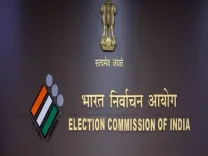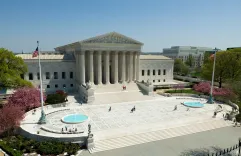The Third Eye: Judicial Advocacy for Equality Rights

New Delhi, Dec 8 (NationPress) In a landmark ruling, the Supreme Court of India on November 25 invalidated the directive from the Telangana state that enabled preferential land allocation to MPs, MLAs, bureaucrats, judges, and journalists within the Greater Hyderabad Municipal Corporation. The court used strong language to characterize the allocation of state resources as capricious, irrational, and arbitrary, determining it breached Article 14 of the Constitution.
Labeling it an abuse of power by the state government aimed at benefiting the wealthy segments of society, the ruling suggested that this practice was indicative of corruption. By upholding the public interest petition, the court concluded that the state’s policy perpetuated inequality and undermined the principle of substantive equality as outlined in the Constitution.
According to the Supreme Court, "When the government allocates land at reduced rates to a select few, it fosters a system of inequality, granting them a material advantage that is out of reach for the average citizen. This preferential treatment sends a clear message that some individuals are entitled to more, not due to their public duties or societal welfare but merely because of their status."
The apex court noted that the policy favored the upper echelons of all three branches of government—legislators, bureaucrats, and members of the higher judiciary—and reminded journalists that as representatives of the Fifth Pillar of democracy, they should provide oversight against any arbitrary exertion of state power, which in this case sought to allocate land under the pretext of benefiting the "deserving sections of society."
This ruling from the Supreme Court effectively challenged the traditional governance model that has persisted in India for decades, significantly criticizing it for violating the fundamental right to equality.
The civil appeal contesting the land allotment in Hyderabad led to a comprehensive ruling in which the Supreme Court mandated restitution, directing that the lease agreements executed by the Telangana state in favor of cooperative societies be annulled. The state is required to refund the full amount paid by members, including stamp duty and registration fees, along with interest at the current RBI rate.
The court even outlined how the development charges paid by the societies would be reimbursed. The court reiterated that while the power to distribute and redistribute public assets lies within the state’s jurisdiction, such discretion is not absolute and must adhere to Article 14 of the Constitution and the principle of equality.
The SC ruled, "It cannot be questioned that state policy and executive actions must fulfill the requirements of this article." This ruling carries significant weight, acting as a deterrent against arbitrary exercise of state power and potentially curbing the politician-bureaucrat nexus that has plagued democracy in India.
Interestingly, on November 25, the Supreme Court also issued another ruling regarding governance philosophy in democratic India, dismissing petitions aimed at removing the terms secular and socialist from the Preamble of the Constitution, words that were inserted during the Emergency through the 42nd Amendment in 1976.
The petitioners argued that there was a contradiction between the principle that the state would neither favor nor oppose any religion and the constitutional protections provided for minorities.
The original assumption of the drafters of the Constitution was that by emphasizing equality before the law and equal treatment of all communities alongside the assurance of freedom of belief as a fundamental right, they had inherently made India a secular state.
The Supreme Court maintained that India has developed its own interpretation of secularism, evolving a tradition where the state neither endorses any religion nor penalizes the practice of any faith.
In any case, secularism is enshrined within the democratic framework of India due to the principle of one man one vote, the absence of any religious affiliation in government, and a guarantee that policies will not favor any specific community.
In earlier judgments, the apex court recognized secularism as a fundamental aspect of the Constitution, equating it with the nation’s commitment to treat individuals of all faiths equally and without discrimination.
The SC opted to retain the terms in the Preamble, seemingly accepting this straightforward non-ideological interpretation.
Regarding the inclusion of the term socialist in the Preamble, it is noted that the Constituent Assembly deemed it unnecessary on the grounds that future generations should not be constrained to a specific economic model. The framers of the Constitution believed in the principle of economic justice.
In the November 25 ruling, the SC did not examine the fact that the Preamble was amended during the Emergency but acknowledged that this issue was settled in 1978 with the passage of the 44th Amendment. It interpreted the term socialist as indicative of a state dedicated to the welfare of its people.
The Constitution aims to provide minimum necessities to all citizens to liberate them from poverty, hunger, and unemployment and mandates the state to narrow the divide between the affluent and the impoverished. Thus, the SC interpreted a ‘socialist state’ in the Indian context as a welfare state—nothing more—since any regime in India is committed to establishing social and economic justice. Classical socialism is an ideology advocating public ownership of all means of production.
Notably, the philosophy of Integral Humanism, proposed by the late Pt Deen Dayal Upadhyay, opposed both Western capitalist individualism and Marxist socialism, seemingly endorsing a middle ground that rejected the excesses of both extremes. The Supreme Court, in the case of secularism, adopted a non-ideological perspective regarding the inclusion of the term socialist in the Preamble, legitimizing its presence.
These two judgments from the Supreme Court, led by the new Chief Justice, hold particular significance as they touch upon the very philosophy of the state upon which Indian democracy is founded. They emphasize that all citizens stand equally before the government, that the core structure of the Indian Constitution will remain intact, that India is dedicated to improving the welfare of its populace, that while rulers may change, the system of governance must maintain continuity, and that vigilance against corruption must persist at all levels and in all aspects of governance.
In the case concerning land allocation in Hyderabad, the Chief Justice remarked, "The benefits bestowed upon the privileged and affluent classes come at a cost as they effectively deprive and deny essentials to marginalized and socially vulnerable populations."
The policy fails to meet the fairness standards set by the Constitution. The apex court, in the Hyderabad case, was essentially evaluating the constitutional validity of actions taken by the democratic administration in everyday governance, establishing a standard of people's interest for them.
It upheld the inclusion of the terms secular and socialist in the Preamble, arguing that they align with the ethos of the Indian Constitution and that the power to amend the Constitution extends to the Preamble as well.
The court also criticized the fact that the petitions were filed years after the amendments had been enacted, implying that the policies of the Indian state should pass scrutiny as long as they ensure people-oriented governance, irrespective of how secularism and socialism are ideologically defined in various contexts.
(The writer is a former Director of the Intelligence Bureau.)








